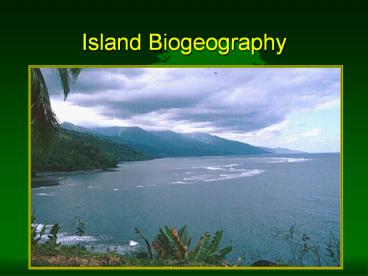Island Biogeography - PowerPoint PPT Presentation
Title: Island Biogeography
1
Island Biogeography
2
Island Biogeography
- Colonization - arrival
- float
- fly
- swim
- be carried
- wind (seeds, spores)
3
Surtsey (1963)
25 miles from Iceland
4
Plant colonization - Surtsey
5
Krakatau (1833)
6
(No Transcript)
7
Colonization - Krakatau
8
Characteristics of Island Species
- Good dispersal ability
- Flock loving animals
- Prefer fresh water, mangroves, secondary forest
on the mainland - High ecological flexibility
9
Maquire (Ecol. Monog. 33161-185)
- Placed bowls of nutrient solution at various
distances and heights from a pond. - Some bowls increased, then decreased in one
species as others moved in. - The number of new species/unit time decreased
with time. They finally reached an equilibrium
state. - Different bowls had different species assemblages.
10
MacArthur and Wilson
High
As species ?, there are more species which could
go extinct.
E
Rate of immigration or extinction
As species ?, the probablility of arrival of new
species ?
I
of Species is a dynamic equilibrium
Low
Number of species on island
11
Enclosing the island
12
Simberloff - equilibrium
13
Size relationships
- If same distance from mainland, immigration
should be the same
E large
14
Small Islands - high turnover rate
- Microtus pennsylvanicus (meadow vole)
- Clethrionomys gapperi (red-backed vole)
- 12 red-backed voles introduced to Rock Island
- rapidly displaced meadow vole in small woodland
- population never gt 30
- went extinct in 3 years
Meadow vole
Red backed vole
15
SABA
MONTSERRAT
CUBA
Hispaniola
Cuba
Puerto Rico
Jamaica
Montserrat
Saba
Redonda
16
Inland Islands
- Mountain tops in New Guinea
17
Species/Area relationships
For most islands z falls between .24-.34 For
areas of the mainland z is between .12-.17
Slope of regression line relating S to A
of species
S CAz
Area
Constant, gives number of species when A 1
Species/Area Curve
18
(No Transcript)
19
Nonequilibrium theory
- Suggested by Lawlor
- Non-flying mammals have not come to equilibrium
on oceanic islands
Text fig. 24.21
20
Relationship to Distance
- Extinction is not likely to be affected by
remoteness
21
NEW GUINEA
22
MacArthur-Wilson model predictions
- Number of species should remain constant over
time - Some species should become extinct over time
- Extinctions balanced by immigrations
- Turnover rate of species should vary with island
area and distance from a source of immigrants
23
Assembly rules
- Worked out by Jared Diamond
- Three sets of rules determining the species mix
on an island - Incidence functions
- Compatibility rules
- Combination rules
24
Incidence Functions
- Incidence functions place species into 3 groups
- Species only on species rich islands.
- Tramps - on species rich islands and with lower
probability on species poor islands. - Super tramps - only on species poor islands.
25
Compatibility rules
- Built from mutually exclusive ranges of pairs of
species. - Certain closely related species cannot co-exist.
26
Combination rules
- Based on diffuse competition rather than direct.
- Prevents certain groups of species from
co-existing. - Calculates the probability of a given combination
being found together on an island of a given size
- The only stochastic part is the order of arrival
of the first colonists.
27
Example Cuba
Banana quit
28
(No Transcript)

